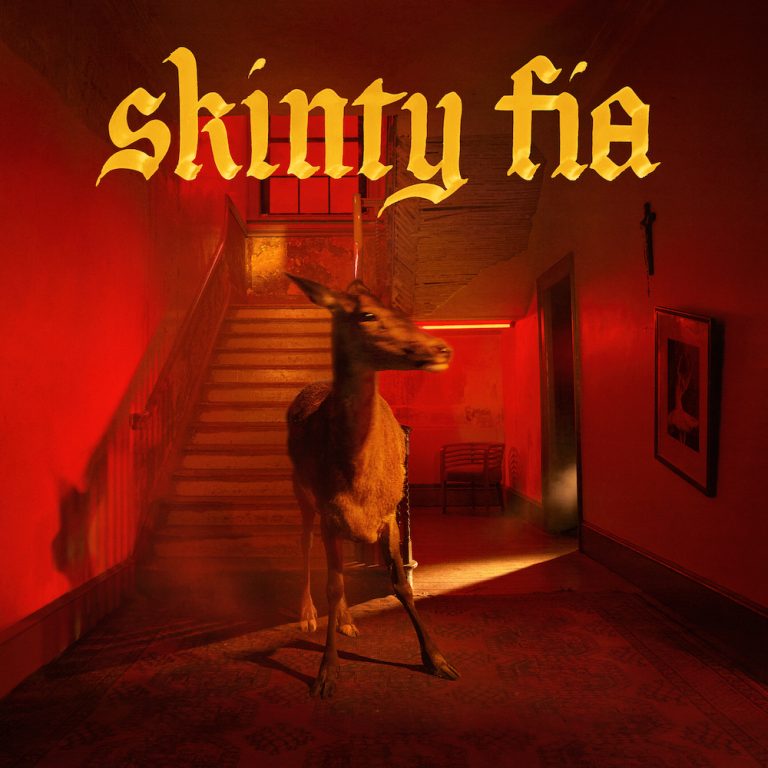With Skinty Fia, Dublin-based quintet Fontaines D.C. synthesize the artsy swagger of their debut, Dogrel, and the post-manic austerity of their second release, A Hero’s Death. Over a 10-track sequence, the band offer haunting euphonies, wistful clamor, and dashes of vintage minimalism, vocalist Grian Chatten reveling in hook-filled commentaries on modern existence, including the flux and static of societal and existential norms.
The intro of album opener “ár gCroíthe go deo” (“In our hearts forever” in Standard Irish or Gaelic) features a lushly blended and slightly discordant vocal palimpsest accompanied by a glitchy pulse. The piece swells as additional instrumentation is added, yielding funereal tones, darkly exultant rhythms, and roiling textures. Chatten segues between forlorn-sounding verses and more assertively delivered choruses, the six-minute epic highlighting Fontaines’ ability to forge entrancing gestalts and stir varied emotions, often simultaneously and with a single passage.
“How Cold Love Is” centers on a vivid portrait of a couple propelled by consumeristic bents that inevitably lead to chronic dissatisfaction, habituating the phenomena of craving and avoidance. One of Fontaines’ more cynical tunes, the track recalls the anhedonic malaises routinely conjured by Shame. While Shame, however, are fundamentally punk-aspirant à la mid-career The Clash and generally transparent re their Swiftian leanings, Fontaines draw more from the suggestively textural side of progenitors such as Cale-era Velvet Underground and their art-rock heirs Television, as well as the neo-Romantic disillusionment of Sonic Youth, their primary intent being to evoke rather than catalyze.
With the hyper-hook-y “Jackie Down the Line”, drummer Tom Coll drives the song busily and buoyantly, the opening minute or so operating as a quasi-jazzy voice-and-percussion interplay. A wiry guitar part soon enters the mix, the band constructing a jangly welter over which Chatten sings, his voice movingly strained. On “Roman Holiday” shoegazey-cum-bluesy guitar parts complement Chatten’s reverb-soaked and deadpan vocal, the mix swirling around Coll’s unwavering drum part, bringing to mind Iceage or early Arctic Monkeys.
“The Couple Across the Way”, like Dogrel’s closing track “Dublin City Sky,” places Fontaines’ impressive eclecticism on display. Chatten’s lilting melody is accompanied by an accordion, the song quickly referencing barroom and gospel-tinged folk, traditional music kept vital by such heritage acts as The Dublineers and The Chieftains, and yet the piece resonates, lyrically and tonally, as quintessentially secular and contemporary. “The world has changed beyond our doorstep / people talk and dress so strange,” Chatten observes, sounding like someone exiting his house for the first time post-pandemic. “I don’t know a neighbor’s name / and all of life is rearranged,” he adds. While the song’s thematic intent is evident – a reiteration of the postmodern view of being as irreparably fragmented – Chatten’s lines still unfold as practices in restraint, intriguingly equanimous, especially when compared to the more heavy-handed, even propagandistic lyrics of a sibling-band such as IDLES, whose motivation, like Shame’s, often occurs as primarily socio-political rather than aesthetic.
On the title song, Fontaines employ compelling contrasts between fluid rhythms and staccato emphases. Chatten’s melody drips with melancholia, while his lyrics address the insincerity of a friend, community, and society at large. With the irresistible “I Love You”, the band transition from shimmery passages to more sultrily beat-driven segments. Chatten unfurls a stunning bildungsroman, addressing his youth, struggle for identity, and resultant assumptions and presumptions regarding people and their dubious priorities. Backed by roiling accents and a chorus-splashed drone that steadily gains in volume and complexity, Chatten’s jeremiad integrates hip-hop cadence, Bukowski’s visceral poetics, and Jim Carroll’s rambling anecdotalism, particularly as presented via 1980’s Catholic Boy.
With Skinty Fia, Fontaines, D.C. continue to position themselves as one of the more emotionally broad-banded and nuanced acts to emerge from the latest post-punk wave. Soundscapes are evocatively sculpted and frequently galvanic, melodies and lyrics consistently enrolling. Moody, grittily philosophic, and cautiously revealing, Skinty Fia spotlights a distinct band as they pivot toward mid-career status, mining the expressive paradoxes on which longevity is built.


